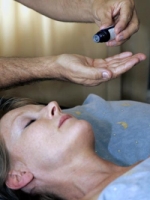Aging Gracefully

Once the menopause is over women enter a new phase of life, sometimes referred to as “the sunset years”, before reaching old age. During these years it is especially important for women to take care of themselves so as to prolong a happy, healthy and active life. During the aging process, circulation slows down and the body’s cells neither receive nourishment nor have harmful toxins eliminated as quickly as before. As a result, circulatory disorders are common: the hands and feet become cold, and wounds take long to heal, for example. Digestive disorders in the elderly are also quite common. As the digestive processes slow down and the large intestine muscles weaken, constipation may occur. This is made more likely by inadequate roughage and fibre in the diet, and can also be seen as a side effect of other medicines. Eating while anxious or frightened can also bring on a variety of digestive disorders. As cell renewal takes longer with age, the skin becomes dry and flaky, and the hair often becomes thinner. Because of this slowing down process, every organ of every system in the body is more susceptible to common illnesses, which are more difficult to shake off. Older people are particularly vulnerable to cold and ‘flu, which can settle on the chest, causing or exacerbating respiratory problems such as bronchitis and asthma. The joints gradually become less flexible and the muscles are more prone to inflammation, and conditions such as arthritis or rheumatism may develop or get worse. As it is often first highlighted during menopause, osteoporosis may become a problem, with the skeletal bones becoming more brittle: falls resulting in broken bones, such as the hip, are much more common in later years.

For many women, the prospect of old age is very frightening and creates tension and anxiety. Many women worry about the possibility of incapacitating illness, such as dementia, Parkinson’s and Alzheimer’s disease. Others suffer frequent headaches, migraines, insomnia and digestive upsets, which maybe caused by the side effects of medical drugs that are being taken for other conditions. In fact, the side effects of medication can be responsible for many ailments apparent in older people. This can set up a vicious circle, where new medicines are prescribed to deal with the side effects of the original drug and which, in turn, can eventually lead to even more unpleasant symptoms. These resulting afflictions are termed iatrogenic because they arise as the side effects of medication taken for the original disease or problem. Aromatherapy is now used in a growing number of hospitals to alleviate the more minor, but unpleasant, effects of iatrogenic disease: insomnia and digestive disorders are the most common, followed by pressure sores for those who are bedridden.

Aromatherapy In Later Life:
For women in their later years the amount of essential oils to be used in any treatment depends on the state of their general health. For those in good mental and physical health, the normal number of drops can be used. For women who are run down, suffering ill-health or are on medication the dosage should be lowered, as follows:
Dosage: In the bath: 4-6 drops of oil dispersed or dissolved first in dairy cream or honey.
For application to the body: 8-10 drops in 50ml (3 1/2 tbsp) carrier lotion
For Inhalation: The number of drops here is not crucial as many of the molecules are carried away by evaporation.
When preparing oils for application, a lotion is the preferred choice for a carrier base: oil bases can cause bottles to become too slippery and messy, often resulting in oil stains. If you suffer from arthritis, for example, you can add the relevant essential oils to a base hand and/or body lotion, to make the treatment easier to administer.
Common Mental Problems With Aging And Solutions Through Aromatherapy